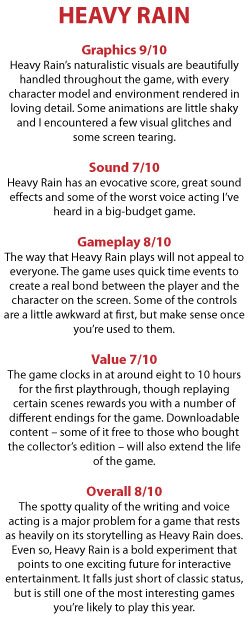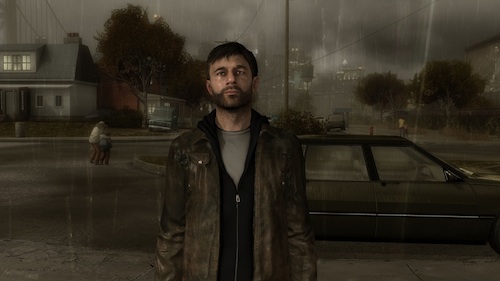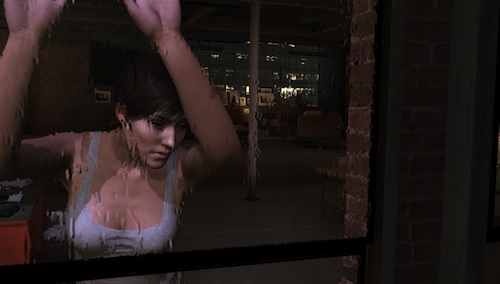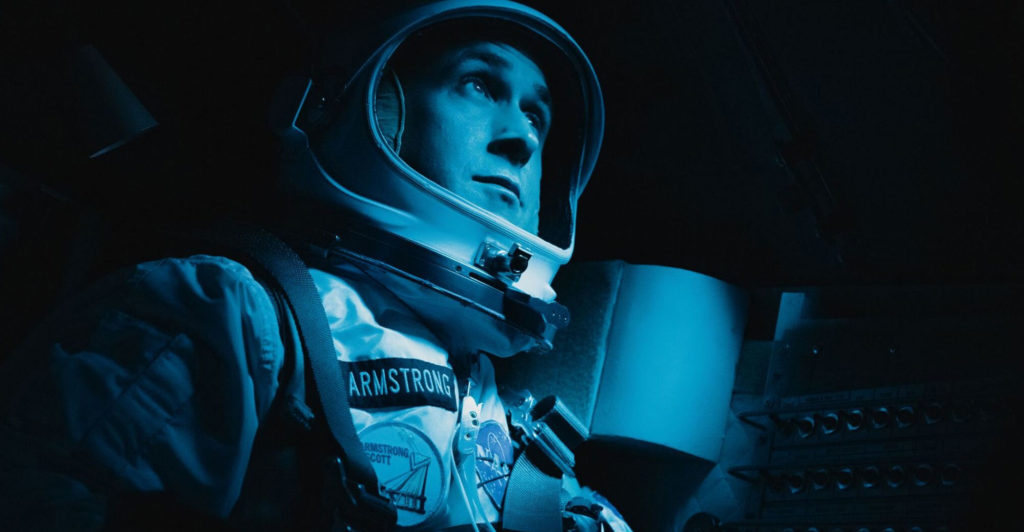A young father scans the crowd in a busy shopping mall, looking for a lost child. He pushes his way through a sea of shoppers. He spots a red balloon across the room, runs towards it hoping that it’s the one his 10-year old son is clutching in his hand. Concern gives way to panic as he calls out for the child.
Then, an incongruous Gallic accent shatters all suspension of disbelief as you remember that you’re not watching a scene unfold in a Philadelphia mall. You’re listening to a French voice actor playing a part in an interactive movie.
That sums up the best and the worst of Heavy Rain, the new PlayStation 3 exclusive developed by French studio Quantic Dream and published by Sony. The game is equally good at setting up engrossing cinematic scenes and undermining them with shoddy voice acting and writing. It’s still a success, but one that falls short of its real potential.
The term “cinematic” has become lazy shorthand for nearly any game that shows some ambition in its writing, acting and storytelling. But Heavy Rain is truly cinematic in the sense that it borrows most of its language from movies rather than from other games.
Heavy Rain is a psychological thriller with a plot and characters that could easily have come out of Hollywood. It follows four characters — a doting father, a private eye, a young female journalist and an FBI investigator — embroiled in a search for a serial killer called the Origami Killer.
 Many games borrow and steal from film, but Heavy Rain is steeped in it. The origami figures the killer leaves behind at the scene of a crime are a tip of the hat to the classic sci-fi noir, Blade Runner. The sheets of autumnal rain pouring down in nearly every scene bring to mind the David Fincher serial killer flick, Se7en.
Many games borrow and steal from film, but Heavy Rain is steeped in it. The origami figures the killer leaves behind at the scene of a crime are a tip of the hat to the classic sci-fi noir, Blade Runner. The sheets of autumnal rain pouring down in nearly every scene bring to mind the David Fincher serial killer flick, Se7en.
As daring as Heavy Rain feels in a market dominated by shooters, racers and sports sims, the game isn’t without its precedents. The idea of an “interactive movie” dates back at least as far as Dragon’s Lair, the laser disc-based game that made jaws drop in arcades around the world during the early 1980s.
With the advent of CD-ROM as a storage medium for PCs in the 1990s, interactive films such as Phantasmagoria and Mag Dog McCree flooded the market. And in 2005, Quantic tried to resurrect the genre with its cult hit, Fahrenheit.
With Heavy Rain, however, Quantic demonstrates that the technology is finally here to allow developers to create compelling interactive movies with completely believable characters and environments. The game’s engine renders human skin and hair with life-like textures, lighting and shadows that look natural, eyes that have intelligence behind them. Moments of uncanny valley are far and few between.
Quantic Dream’s David Cage is one of the few videogame directors who really understand mise-en-scène. The environments of his game are not levels. They’re sets where everything — the lighting, the props, the actors, the camera angles, the music — is carefully composed for scenes in the larger drama to play out.
Heavy Rain is like a movie because the player is never really directing the actions of any of the characters. Most games aim to make the player feel in control of the avatar on the screen, perhaps even assume its identity. Heavy Rain simply tries to get you to empathise with a character playing a role in a bigger story.
It’s a subtle but important distinction. If you’ve been playing videogames as long as I have, Heavy Rain runs contrary to your instincts. As soon as I’m given control of a character, my instinct is run off and explore the environment to find health packs, ammunition, floating tokens.
None of those exist in Heavy Rain. You take control of the characters with the purpose of tripping the invisible wire that triggers the next development in the plot. There is no real concept of success or failure in the game. There is no “game over” screen, no health meter, no inventory to manage.
When things don’t work out right for the character I’m controlling, my natural instinct is to load the last save and try again. Heavy Rain wants you to accept that a careless word or action, even a mistake that leads to the death of a major character, simply results in a different story emerging.
Even when you replay a scene to get a different outcome, it’s more like watching an alternate cut of the same film than reshaping a character’s destiny. There is some sleight of hand here — though many of the scenarios can play out in multiple ways, only a few have a real impact on the way that the game ends. But the illusion is a convincing one.
There are many moments of inspired narrative and gameplay design in Heavy Rain — and the two cannot be split as easily or conveniently as they can in most games. Heavy Rain tries to tap parts of the human experience — regret, loss, family life — that most other games steer clear of.
Just one example: you start the game in the shoes of Ethan Mars, devoted husband and father, as he begins his morning. The mundane domestic scene that unfolds — Ethan showering and dressing, downing a coffee, doing some work, playing with the kids — works both as an elegant tutorial for the game’s unusual control scheme and as a way of building your empathy with a character who is about to have an awful day.

Sure, there are plenty of heart-pounding action scenes. But violence in Heavy Rain feels far more consequential than in most videogames, whether it’s being inflicted by or on your player character. Chases and fights are tense and meaningful, not because you fear failure and a game-over screen, but because they have dramatic context, because they happen to characters you care about.
Heavy Rain’s control scheme and interface represent as much of a breakthrough as its visuals. The game uses quick time events (QTEs) — “Simon says” on-screen prompts that tell you what to you with your controller as the action unfolds. But its implementation of a concept hated by so many gamers is years ahead of any other I’ve seen.
QTEs in Heavy Rain are seamlessly integrated into the game and they are forgiving enough to seldom be frustrating. They help you to understand what the character on the screen is thinking and how he or she is feeling. If you need to perform an action that demands strength, you’ll need to pound a face button on the controller or shake it vigorously.
If the character is doing something that demands careful coordination of number of hands and feet, you’ll be prompted to hold down a button, then another, and another, until you feel like you’re playing Twister with your fingers. You’ll heave a sigh of relief when you can finally release the buttons.
You can hold down a shoulder button to see the thoughts swirling around your character’s mind. If he or she is under stress, the text will jitter and snake around quickly and unpredictably. I’m not normally a fan of control schemes that call attention to themselves, but the way Heavy Rain uses your controller as an extension of its storytelling is groundbreaking.
Given the attention to detail that most parts of the Heavy Rain received, one can’t help feeling disappointed by the poor quality of some of the voice acting and writing. Most of the actors have pronounced French accents. Even worse, some of them deliver their lines in wooden tones or with amateur drama society enthusiasm.
I routinely forgive stilted dialogue, contrived plots and hammy voices in cartoonish Japanese action games that are about the gameplay and not the story. I can’t look past them as easily in Heavy Rain. Everything else about the game talks to the part of my brain that is wired to anticipate Hollywood realism. The disconnection between the expectations the game creates and what it delivers can be jarring.
Also on the downside, Heavy Rain has a number of glitches and bugs, despite asking you to download a 230MB patch when you first start it up. Heavy Rain froze a few times during my playthroughs of the game and some gamers have reported losing their game saves after crashes.
But whatever faults Heavy Rain has, it’s an intriguing gamble from Sony and Quantic Dream. It’s flawed and occasionally frustrating, but it’s also engrossing, exciting and often moving.
Not every gamer will like Heavy Rain — but every adventurous gamer should at least give it a try. — Lance Harris, TechCentral
- Subscribe to our free daily newsletter
- Follow us on Twitter or on Facebook





